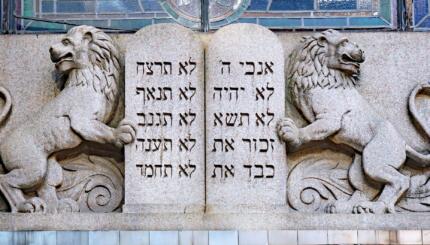Ashkenazic custom: Ezekiel 36:16-38
Sephardic custom: Ezekiel 36:16-36
Shabbat Parah falls on the Shabbat prior to Shabbat Hachodesh (which is either on Rosh Chodesh Nisan, or the Saturday prior).
The maftir reading for Shabbat Parah, Numbers 19:1-22, deals with the red heifer whose ashes were combined with water to ritually purify anyone who had been in contact with a dead person. Because only people who were pure could eat from the Passover sacrifice, a public announcement right before Nisan reminded anyone who had become impure to purify themselves before making the Passover pilgrimage to Jerusalem.
In the haftarah for Parashat Parah, Ezekiel berates the people for defiling the House of Israel, and taking God’s name in vain. Their disrespect for God caused their exile and dispersion.
With your help, My Jewish Learning can provide endless opportunities for learning, connection and discovery.
Redemption to Avoid Further Humiliation
Ezekiel says that God is concerned with the reputation of His name. For His sake alone God will bring the people back together and purify them. God will give them a new heart, and return the holy spirit to them so that the people follow and faithfully observe God’s laws. God will also purify them: "I will sprinkle clean water upon you, and you shall be clean" (36:25).
When the people have been gathered in the Land of Israel, there will be abundant grain crops, and trees filled with fruit so that the people will never again be humiliated in front of the other nations. Ruined places will be rebuilt, and small settlements will be full of people. Thus, the nations around Israel will see the rewards that God bestows upon His people.
In the final two verses of the haftarah (not read by Sephardim) God promises to multiply the people "like sheep" and this he will do for "their sake" (36:37). Jerusalem will be full of people who will all know that the Lord is God.
Connection to the Maftir
Just as the maftir aliyah for Parashat Parah presents an ancient rite of detoxification for those who have come in contact with the dead, the haftarah explains how Israel will be purified by God, and in fact brought back to life with a new heart and a new spirit.
aliyah
Pronounced: a-LEE-yuh for synagogue use, ah-lee-YAH for immigration to Israel, Origin: Hebrew, literally, "to go up." This can mean the honor of saying a blessing before and after the Torah reading during a worship service, or immigrating to Israel.
Nisan
Pronounced: nee-SAHN, Origin: Hebrew, Jewish month, usually coinciding with March-April.
Shabbat
Pronounced: shuh-BAHT or shah-BAHT, Origin: Hebrew, the Sabbath, from sundown Friday to sundown Saturday.


